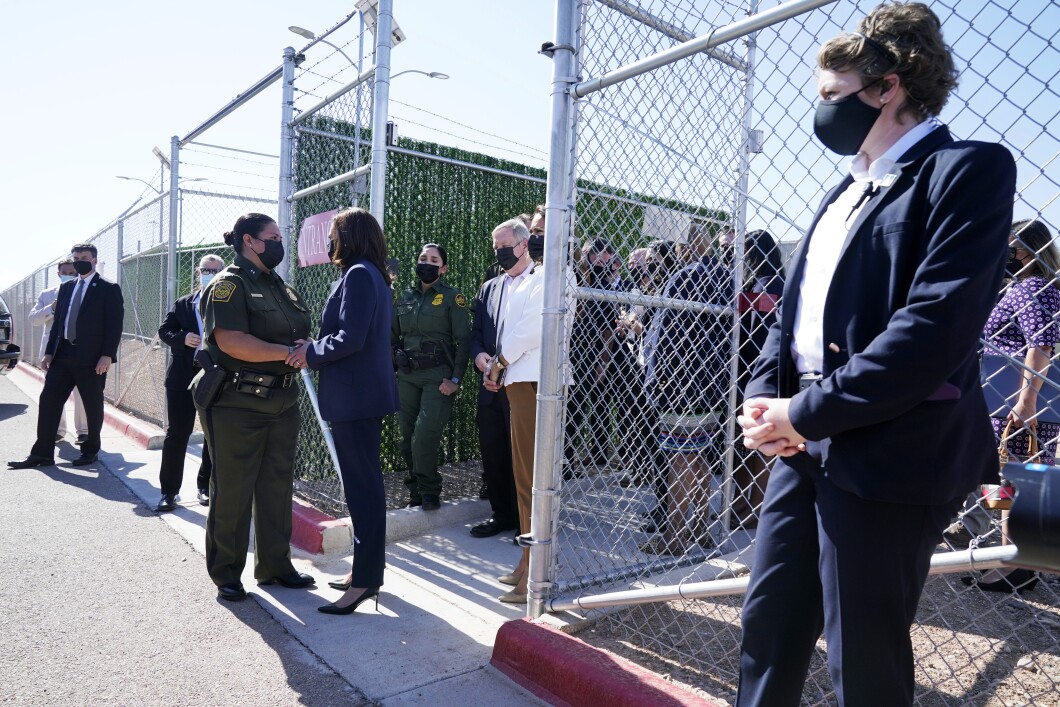
When Vice President Kamala Harris assessed the U.S.-Mexico border as “secure” weeks ago, lawmakers across the political aisle balked.
Tens of thousands of illegal immigrants are apprehended each month trying to reach the United States, coming in record numbers since President Joe Biden and Harris took office on Jan. 20, 2021. The surge comes despite Harris’s diplomatic entreaties to Mexican officials after Biden put her in charge of overseeing border security.
While Harris’s approach to border security has drawn criticism from congressional Republicans, some Democratic lawmakers have been unsparing in critiquing Harris’s job performance.
Harris “is absolutely wrong on that. It’s not secure,” Rep. Tim Ryan, the Ohio Democratic Senate nominee, said in a debate against GOP rival J.D. Vance. “We have a lot of work to do.”
And Rep. Henry Cuellar (D-TX), in a tough reelection fight in the new Laredo and eastern San Antonio suburbs 28th Congressional District, mocked Harris’s claims of a “secure” southern border.
“You’re talking about … maybe 4.4 million individuals in two years,” Cuellar told CNN. “If you call that secure, I don’t know what secure is.”
Tasked by Biden with slowing the number of arrivals at the border, Harris has taken pains to stress that her focus is on the diplomatic side of the equation, not on “doing the border,” as one aide put it to reporters early on.

Biden’s own advisers had assessed the political risk. In April 2021, not long after the president entered the White House, his pollster, John Anzalone, shone a spotlight on the issue in a memo, stating, “Immigration is a growing vulnerability for the president.” Drawing on surveys and private polling, Anzalone wrote that “voters do not feel he has a plan to address the situation on the border, and it is starting to take a toll.”
The note came just weeks after the president had tasked Harris with slowing the number of arrivals at the border, a role described as a politically fraught “hand grenade” by one Republican strategist at the time.
Yet the effort promised potential rewards for a vice president with higher aspirations who was seeking to burnish her national profile. Reports later that year indicated that Harris bristled at being assigned a no-win task that could hamper her political future. Yet when asked at an event whether she was concerned about taking on an issue that had long vexed other politicians, Harris responded, “No.”
Stepping into the position, Harris met with leaders from Mexico, Guatemala, and Honduras, routing new investments to the region and committing billions of dollars in aid. The strategy aimed to tackle the root causes of migration by improving economic conditions in the various countries of origin.
Harris has also said the crisis necessitates a legislative solution, urging lawmakers to consider a pathway to citizenship as part of a “humane and appropriate approach” to the problem.
Harris’s office declined to offer a comment.
But over the summer, cracks between the U.S. and its partners south of the border spilled into public view as Mexican President Andres Manuel Lopez Obrador became the first leader to say he would not attend a summit of Latin American leaders amid objections over the U.S. invitation list. Other leaders abstained too, including those courted by Harris. U.S. officials denied that the failure to pull together U.S. partners stunted cooperation.
The number of immigrants arriving at the border has not slowed despite these efforts and has weighed heavily on voters.
According to an NPR poll this summer, 54% of respondents said the country was fielding an “invasion” at the southern border, including 40% of Democrats and 46% of independents. In a September NBC News survey, more than a quarter of respondents identified border security as the nation’s first or second most important issue.
Those living along the U.S. border have wondered aloud why the White House has failed to confront the concerns facing their communities. Republicans, too, have pressed for answers.
For Harris, however, the political ramifications are still coming into view.
Biden is weighing a decision over whether to seek reelection in 2024, with Harris viewed among his top would-be successors to lead a Democratic presidential ticket.
At the same time, the administration’s handling of the migration surge will likely face increased scrutiny in Congress.
Outside the White House, Biden is facing calls to forgo a reelection bid — along with Harris, who, like the president, is saddled with low approval numbers.
But it is Harris’s handling of the role that Washington Post columnist George Will argued was most egregious, particularly the vice president’s “meanderings” on the border and other issues.
Citing “an Everest of evidence,” Will dug the knife in, calling Harris “starkly unqualified” to be president.






